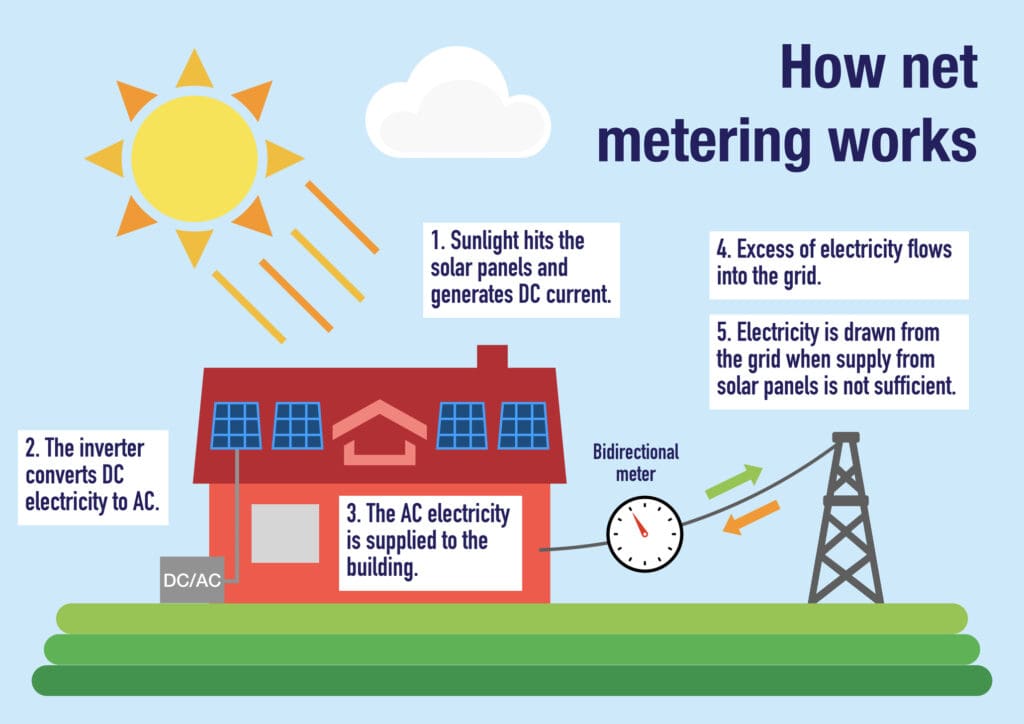Harnessing Solar Energy: Maximizing Solar Savings with Net Metering in Connecticut
Net Metering Explained: How Solar Panels Work with Your Utility Bill
If you’re thinking about going solar, you’ve likely heard the term net metering. But what exactly is net metering, and how does it work with your solar panels? Understanding this process is key to maximizing your solar investment and reducing your energy costs. In this blog, we’ll break down net metering and explain how it benefits homeowners with solar power systems.
What Is Net Metering?
Net metering is a billing system that allows homeowners with solar panels to receive credits on their utility bills for the excess electricity they generate. When your solar panels produce more energy than your home uses, the surplus energy is sent back to the grid. In return, your utility company gives you credits for that extra power. When your solar panels aren’t producing enough electricity to meet your needs (such as during the night or cloudy days), you can use the credits you’ve earned to offset the energy you pull from the grid.
Think of it as a give-and-take relationship: during sunny periods, your solar system may generate more electricity than your household needs, and your utility meter essentially runs backward. When you need to draw electricity from the grid, the meter runs forward, but at a reduced cost because of the credits you’ve banked.
How Does Net Metering Work with Solar Panels?
1. Daytime: Solar Power Generation
During the day, when your solar panels are actively generating electricity, they often produce more power than your home consumes. For example, on a bright summer afternoon when your energy usage is low but solar production is high, your system may produce a surplus of energy. Instead of letting that extra energy go to waste, net metering sends it back to the grid, and your utility provider gives you credits in return.
2. Nighttime or Low-Sunlight Periods: Using Grid Energy
At night or on days with little sunlight, your solar panels aren’t generating enough electricity to power your home fully. In these instances, your home will automatically draw electricity from the grid. This is where the credits you’ve earned come into play—they help offset the cost of the electricity you use from the grid.
3. Billing Cycle: Credits and Savings
At the end of your billing cycle, your utility provider calculates how much energy you consumed from the grid versus how much you exported back through your solar panels. If you produced more than you used, you’ll see a credit on your next bill. If you used more than you generated, you’ll only be charged for the “net” amount, hence the term net metering. In Connecticut, these credits can roll over month to month, allowing you to bank energy for future use.
Benefits of Net Metering
1. Lower Energy Bills
The primary advantage of net metering is that it reduces your energy bills. By offsetting the electricity you use from the grid with the energy your solar panels produce, you significantly reduce the amount you pay to your utility company. In some cases, homeowners can eliminate their electricity bills entirely.
2. Maximizes Solar Energy Production
Net metering ensures that none of the electricity generated by your solar panels goes to waste. Even when you’re not home using the power—say you’re at work or on vacation—your solar system is still working, and the energy it produces is sent to the grid, earning you valuable credits.
3. Acts as a Backup
Since your home remains connected to the grid, you can rely on it as a backup when your solar panels aren’t producing enough energy. This means you don’t need to install costly battery storage systems, as net metering effectively “stores” your excess energy in the form of credits for later use.
4. Promotes a Clean Energy Future
By exporting excess electricity to the grid, you’re contributing to the broader adoption of renewable energy. Your solar energy helps reduce the overall demand for fossil fuel-based power, benefiting both the environment and your community.
How Net Metering Works in Connecticut
In Connecticut, net metering is available for residential and commercial solar energy systems. The state has implemented policies that are solar-friendly, offering homeowners the opportunity to maximize their investment in renewable energy.
- Connecticut’s Net Metering Policy: Connecticut has a strong net metering program that allows solar customers to send their excess power back to the grid and receive credits. The program ensures that you are credited at the retail rate for the energy you produce, making it an attractive option for homeowners looking to save on their energy bills.
- Monthly Rollover of Credits: Connecticut’s policy allows unused credits to roll over from month to month. This means that during sunnier months, you can accumulate credits to use during the winter or times when your system generates less energy.
- Caps and Limits: The state of Connecticut currently caps the total amount of net-metered electricity at a certain percentage of each utility’s total power supply. However, this cap hasn’t limited homeowners from benefiting from the program.
What Happens When You Produce More Energy Than You Use?
In Connecticut, if you produce more energy than you use over the course of a year, your utility provider may pay you for the excess electricity, though often at a lower wholesale rate rather than the full retail price. However, most homeowners consume all their credits throughout the year, especially during seasons with shorter days or higher energy usage, so this situation is relatively rare.
How to Make the Most of Net Metering
To maximize the benefits of net metering, it’s important to consider your energy consumption habits and the size of your solar system. Here are some tips:
- Right-Size Your Solar System: Make sure your solar energy system is sized appropriately for your home’s energy needs. If your system is too small, you may not generate enough electricity to benefit fully from net metering. If it’s too large, you may produce more energy than you can use or get credited for.
- Monitor Your Energy Use: Keeping track of your energy consumption helps you better understand when and how you’re using electricity. By adjusting your habits—such as running appliances during daylight hours when your panels are producing—you can take full advantage of the energy your system generates.
Conclusion: Why Net Metering Is a Solar Homeowner’s Best Friend
Net metering is one of the key benefits of going solar. It allows you to get the most out of your solar energy system, saving you money and ensuring none of your solar power goes to waste. In Connecticut, the state’s favorable net metering policies make solar an even smarter choice for homeowners looking to reduce their utility bills and support renewable energy.
At Northwest Hills Solar, we help homeowners understand the ins and outs of net metering and design solar systems that maximize your savings. Ready to start your solar journey? Contact us today to learn more about how solar energy and net metering can benefit you!

